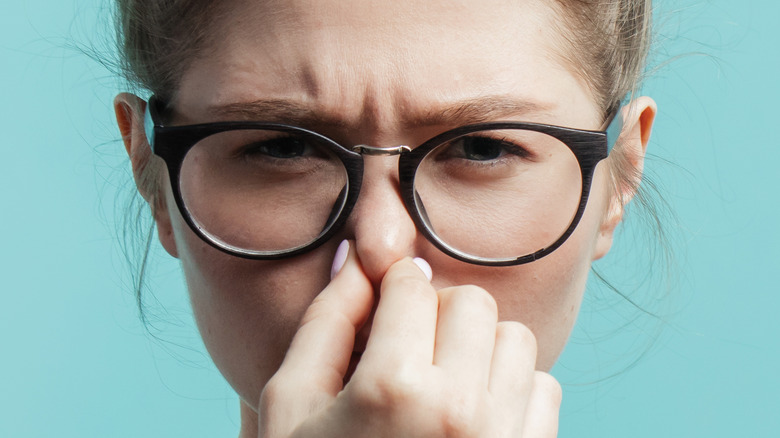The Truth Behind The Theory That Smelling Farts Is Good For You
The human body is one of the most incredible and efficient machines in history. It's capable of remarkable feats of endurance, creating lasting works of art like the Mona Lisa, and writing wondrous works of literature. In tandem with our brilliant brains, of course.
Our bodies can be more than a little disgusting too, though. What with burps and farts, we seem to be purpose-built to expel gas in the most horrific manner possible. According to Guinness World Records, the world's loudest male burp was an astonishing 112.4 db, achieved by Australia's Neville Sharp in July 2021. Sharp, according to Guinness, had been practicing for more than five years in order to achieve the gross feat.
There's no need to be a world record breaker in order to burp and fart up a storm, though. These are the most primal, instinctive, intentionally-or-unintentionally hilarious bodily functions of all. We've all been disgusted (and disgusted others in turn) with our flatulence, but there's a famous theory that the smell of farts can actually be good for you.
Hydrogen sulfide gas has surprising health benefits
If you've ever pulled somebody's finger or fallen for the classic fart-under-the-bedcover trick, you'll surely doubt that there could ever be any possible health benefits to smelling a lingering fart, especially someone else's. Curiously, though, it seems that really could be the case. In 2014, Sophie Le Trionnaire et al published the paper "The synthesis and functional evaluation of a mitochondria-targeted hydrogen sulfide donor ..." in MedChemComm (posted at the Royal Society of Chemistry). Said hydrogen sulfide, the study reported (via the Huffington Post), is the element of a fart that gives it its horrific smell (which differs on a fart-by-fart basis, of course).
According to the Government of Western Australia's Department of Health, this smelly gas "is often associated with the decomposition of organic material," which makes the link to foul-smelling digestive system activity rather clear. According to the study, it's also the hydrogen sulfide that can be good for the body. In the study (via Huffington Post), Dr. Mark Wood reported that hydrogen sulfide could have "significant implications for future therapies for a variety of diseases." Dr. Wood even went on to deem it a "healthcare hero."
As The Sun reports, via the New York Post in 2017, mitochondrial health can be reliant upon hydrogen sulfide, which the body can create itself to help tackle illness. Matt Whiteman of the University of Exeter's medical school explained, per the outlet, "When cells become stressed by disease, they draw in enzymes to generate minute quantities of hydrogen sulfide ... This keeps the mitochondria ticking over and allows cells to live."
Humanity's smelly savior?
Crucially, though, the reported health benefits of hydrogen sulfide doesn't necessarily mean that smelling farts is good for you. Per Healthline, factors such as taking certain medications and a high-fiber diet can make a fart smell worse, and nobody will want to hang around in the room for that.
According to another Healthline report, the study utilized AP39, a sort of artificial hydrogen sulfide. This compound hasn't been extensively tested on humans, but it has proven effective in a limited range of studies. It could, according to the outlet, prove to be effective against a range of ailments, such as kidney failure. A 2018 study published in Circulation Research, "Evolution of Hydrogen Sulfide Therapeutics to Treat Cardiovascular Disease," states, "it is now well established that H2S broadly influences multiple signaling pathways, and its multiorgan protective effects render H2S a promising target for the treatment of cardiovascular disease, which is regularly accompanied by multiple comorbidities."
Farts, indirectly, could be the keys to helping humanity tackle some of the deadliest diseases it faces. Centers for Disease Control and Prevention reports that diseases of the heart kill two people every 68 seconds in the U.S., and further research on this smelly gas could be one key to tackling this deadly threat. Being directly farted on and smelling the gross results, without the ability to utilize the chemicals involved, may not avail you of much, however.


